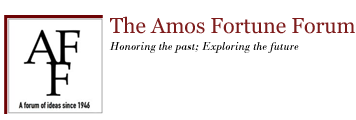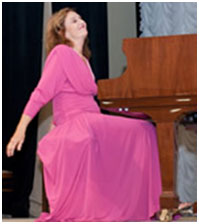2018 72nd Season Summer Speakers
July 13 Patricia Brennan
Time to Step Up! Defending Oddball Science
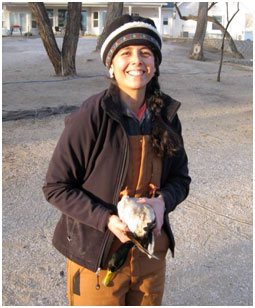 Despite general agreement on the importance of science as a whole, public trust in science is eroding and political attacks on science continue. Many attacks are directed towards research that seems strange and not geared towards solving particular societal problems, what we might call oddball science. These attacks reflect a deep lack of understanding and support for basic science that has devastating consequences to innovation. Dr. Brennan will discuss the experience of having her basic research on duck genitalia being attacked for political gain, and what she learned about science misperceptions in society. She will offer many examples that highlight why we need to support more basic science, and how we can all participate in this process.
Despite general agreement on the importance of science as a whole, public trust in science is eroding and political attacks on science continue. Many attacks are directed towards research that seems strange and not geared towards solving particular societal problems, what we might call oddball science. These attacks reflect a deep lack of understanding and support for basic science that has devastating consequences to innovation. Dr. Brennan will discuss the experience of having her basic research on duck genitalia being attacked for political gain, and what she learned about science misperceptions in society. She will offer many examples that highlight why we need to support more basic science, and how we can all participate in this process.
She will offer many examples that highlight why we need to support more basic science, and how we can all participate in this process.
Patty Brennan received her undergraduate degree in her native Colombia in the field of Marine Biology in 1994. In the spring of 2005, she received her PhD in Behavioral Ecology from the Department of Neurobiology and Behavior at Cornell. She has held teaching or research positions at Yale University, U Mass Amherst, and Mount Holyoke College, and a number of fellowships, including a post-doctoral fellowship at Yale, and a National Science Foundation post-doctoral Minority Fellowship. Her research has been featured in radio, internet videos, blogs and other media, including scientific magazines and encyclopedias. It focuses on the sex lives of dolphins, ducks and shrimp, but also on the relationship between this topic and public funding. Outside of research, one of her interests has been in mentoring. She has mentored numerous undergraduates, including women and members of underrepresented minorities.
July 20 Deborah Klimburg-Salter
Preserving the Cultural Heritage of Afghanistan
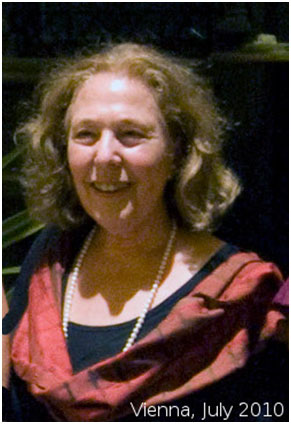 The National Museum of Afghanistan in Kabul had been ranked among the most important Museums in Asia. The original collection of over 100,000 objects was obtained exclusively from controlled excavations in Afghanistan and included exceptional masterpieces from Afghanistan’s five-thousand-year history. Severe losses occurred during the war with the Taliban at the beginning of the 21st century, mostly because of stray bombs, fire, and looting. . Thanks to the extraordinary courage of the curators many thousands of the portable treasures were saved. Thanks to the efforts of many Afghans and foreign collaborators since 2001, the Kabul Museum is once again restored and functioning. Our speaker will discuss the astonishing revival of the museum. Many ancient antiquities have been restored, and several spectacular new archeological finds in the last ten years have greatly enriched the collections. The young curatorial staff have a great burden of responsibility but also pride in their work. Over the main entrance to the bombed-out Museum hangs a sign in Dari and English that reads: “A Nation stays alive whose culture stays alive.”
The National Museum of Afghanistan in Kabul had been ranked among the most important Museums in Asia. The original collection of over 100,000 objects was obtained exclusively from controlled excavations in Afghanistan and included exceptional masterpieces from Afghanistan’s five-thousand-year history. Severe losses occurred during the war with the Taliban at the beginning of the 21st century, mostly because of stray bombs, fire, and looting. . Thanks to the extraordinary courage of the curators many thousands of the portable treasures were saved. Thanks to the efforts of many Afghans and foreign collaborators since 2001, the Kabul Museum is once again restored and functioning. Our speaker will discuss the astonishing revival of the museum. Many ancient antiquities have been restored, and several spectacular new archeological finds in the last ten years have greatly enriched the collections. The young curatorial staff have a great burden of responsibility but also pride in their work. Over the main entrance to the bombed-out Museum hangs a sign in Dari and English that reads: “A Nation stays alive whose culture stays alive.”
Deborah Klimburg-Salter is University Professor Emeritus, Institute for Art History, University of Vienna; and Associate, Department of South Asian Studies, Harvard University. She has taught as a guest professor in distinguished universities in Europe, North America, and Asia, and was the founding director 2006-2015 of CIRDIS (Center for Interdisciplinary Research and Documentation of Inner and South Asian Cultural History). Since 2004 Klimburg-Salter has been director of a curatorial training program for the National Museum of Afghanistan in Kabul/Univ. of Vienna. Her research interests focus on South and Inner Asia, from Afghanistan through Northern India, as well as the arts of Tibet; and heritage preservation in Afghanistan and in the Tibetan Cultural Zone. Her most recent publication is Discovering Tibet, The Tucci Expeditions and Tibetan Painting. It is the Catalogue for exhibitions of the same name in Rome and Genoa as well as for the exhibition “Unknown Tibet: The Tucci Expeditions and Buddhist Painting” at the Asia Society Museum, New York Feb-May 2018.
July 27 Jonathan F. Putnam
How did the Young Lincoln become Our Lincoln?
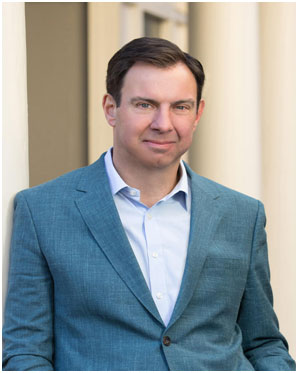 Most of us have a similar image in our minds of Abraham Lincoln, the 16th President and one of the most consequential persons in American history. Whether from the landmark Matthew Brady photographs or popular culture, we picture him as a commanding and forceful figure and at the same time aging, bearded, and careworn — the burdens of saving the Union palpably weighing on his shoulders. But if we had encountered the young Lincoln at the midpoint of his life, we would literally not recognize the icon we think we know. Instead we would see an itinerant, rootless young man, who struggled through an unhappy childhood marked by the deaths of his mother and both siblings, and who then bounced around from job to job, not succeeding at any while building up a large personal debt (which he would later refer to as “the national debt”). The young Lincoln was, in his own words, “a floating piece of driftwood.”
Most of us have a similar image in our minds of Abraham Lincoln, the 16th President and one of the most consequential persons in American history. Whether from the landmark Matthew Brady photographs or popular culture, we picture him as a commanding and forceful figure and at the same time aging, bearded, and careworn — the burdens of saving the Union palpably weighing on his shoulders. But if we had encountered the young Lincoln at the midpoint of his life, we would literally not recognize the icon we think we know. Instead we would see an itinerant, rootless young man, who struggled through an unhappy childhood marked by the deaths of his mother and both siblings, and who then bounced around from job to job, not succeeding at any while building up a large personal debt (which he would later refer to as “the national debt”). The young Lincoln was, in his own words, “a floating piece of driftwood.”
Jonathan F. Putnam has been spending the past decade studying the young Lincoln through the eyes of a man who did, in fact, meet Lincoln exactly halfway through his life and was to become his closest friend, a well-born Southerner named Joshua Speed. Jonathan’s Lincoln & Speed Mystery book series, based on Lincoln’s actual life and times, explores how the improbable, intimate friendship of two men with profound differences in background and outlook changed both of them and changed the course of American history. He will share his findings and thoughts during this talk. Jonathan is a nationally renowned trial lawyer and recognized Lincoln scholar. He and his wife have three sons. They live in London, England, and Massachusetts.
August 3 Virginia Eskin
Cather, Beach, and MacDowell: Three Who Knew the Monadnock Area and Made Good on the National Stage
Virginia Eskin, a classical pianist, is well-known to local New Hampshire audiences. Her presentation this evening will be unusual, in that it combines descriptions in words with musical interludes on the piano. Some of these interludes will be from rarely heard compositions. She will focus mainly on three individuals. Willa Cather, who is buried in Jaffrey, came from Nebraska, but many of her stories were inspired here. The talk will show the connections between her literary works and the music she specifically references. Composer Amy Beach, who was born in Henniker, moved to Boston as a teenager but never forgot New Hampshire. She spent many summers at the MacDowell Colony. The talk will describe her life there and the way New Hampshire birds made their way into her music. Edward MacDowell, a towering figure in American music history, had a long series of New Hampshire connections. The talk will focus on his genre pieces with New Hampshire titles, and it will point out specifically American qualities found in his compositions.
Virginia Eskin grew up in California but took much of her musical training in England. She has lived in New Hampshire since the 1980s, and now owns a cottage on Gilmore Pond. She is inspired by the vast number of important cultural personages who have drawn creative impulses from this state and this area in particular. She is known as a champion of music by women and has lectured on television and at Keene State College. She has traveled to Russia to speak and perform on her specialties and has been honored by a Lifetime Achievement Award from the Lotus Club of New York.
August 10 Seth Brenzel
Developing Youth through Music, Creativity, and Community
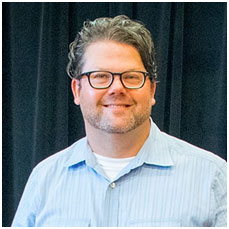 In our world of hair-raising headlines and constant communication, young people increasingly need a respite from such day-to-day distractions. Summer camp offers just such a retreat, and one such camp, The Walden School, has been in Dublin since 1983. The program has been providing an opportunity for young musicians from around the world to take part in a creative community where expert teachers mentor students in the craft of musical composition. Seth will discuss Walden’s unique musical pedagogy, explore essential elements of a positive youth development culture, and consider creativity and community as co-equal components of transformative experiences for young people.
In our world of hair-raising headlines and constant communication, young people increasingly need a respite from such day-to-day distractions. Summer camp offers just such a retreat, and one such camp, The Walden School, has been in Dublin since 1983. The program has been providing an opportunity for young musicians from around the world to take part in a creative community where expert teachers mentor students in the craft of musical composition. Seth will discuss Walden’s unique musical pedagogy, explore essential elements of a positive youth development culture, and consider creativity and community as co-equal components of transformative experiences for young people.
Seth Brenzel has been associated with The Walden School for nearly 30 years. He was fortunate to be a student at Walden for six summers (1985-1990), and since 1994, has served Walden as a staff member, faculty member, Director of Operations, and as the Associate Director from 1996 to 2003, when he became the Walden School’s Executive Director. Since 1995, he has sung tenor with the Grammy Award-winning San Francisco Symphony Chorus and is currently a professional member of that ensemble. Seth received his B.A., in Music and Political Science, from Swarthmore College, where he served as President of the College’s Alumni Association. He received an M.B.A. from the Haas School of Business, University of California, Berkeley, with a focus in non-profit management and marketing; he has also served on the Haas School’s Development Council. He is a 2012 graduate of Leadership San Francisco, where he has also served as an alumni advisor. Prior to becoming Walden’s first full-time Executive Director, Seth worked part-time for Walden during the year and held positions as a senior consultant at Deloitte Consulting, in marketing and public relations at the San Francisco Symphony, and most recently led both the marketing and the enterprise sales teams for an internet software company, now part of Adobe. When not at Walden, Seth lives in San Francisco with his partner, Malcolm Gaines, and their daughter, Cora.
August 17 Steve Walker
The Future of Energy and How Our Region Can Lead the Transition to Decentralized Renewable Energy Production.
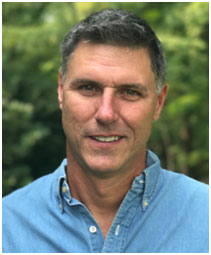 Since the 19th century, fossil fuels have been the primary energy source powering human development and progress. However, IMBY Energy was founded under the belief that the future of energy will not be dominated by fossil fuels. After selling his bio-energy company in 2014, Steve formed IMBY Energy and put together two world-class teams centered around the development and integration of a small-scale cogeneration system and cold-climate heat pump. Integrating a cogeneration system with the cold-climate heat pump allows us to produce a single, attractive appliance that (1) meets all energy needs of residential and commercial buildings while reducing energy consumption and emissions, (2) increases grid reliability, resilience, and efficiency, and (3) will aid in the global transition to renewable fuels through fuel flexibility. The talk will focus on these discoveries and ideas.
Since the 19th century, fossil fuels have been the primary energy source powering human development and progress. However, IMBY Energy was founded under the belief that the future of energy will not be dominated by fossil fuels. After selling his bio-energy company in 2014, Steve formed IMBY Energy and put together two world-class teams centered around the development and integration of a small-scale cogeneration system and cold-climate heat pump. Integrating a cogeneration system with the cold-climate heat pump allows us to produce a single, attractive appliance that (1) meets all energy needs of residential and commercial buildings while reducing energy consumption and emissions, (2) increases grid reliability, resilience, and efficiency, and (3) will aid in the global transition to renewable fuels through fuel flexibility. The talk will focus on these discoveries and ideas.
A serial entrepreneur, Steve Walker spends his days thinking about how the world (mis)uses energy and how he can make that better. He founded, grew, and sold more than five companies in his 33-year professional career and has advised dozens of other organizations as a member of the Board of Directors, consultant, political appointee or volunteer. Like many entrepreneurs, Steve achieved his success without higher education. He is a self-taught engineer who also holds a high-level of business acumen — a combination of skills that rarely go hand in hand.
As the founder of IMBY Energy, Steve is putting his engineering, analytical and business acuity to work creating world-changing energy technologies that will transform the way people heat, cool and power their homes and businesses all over the world. The recipient of numerous awards, his work has been recognized by national organizations, as well as regional and state-focused organizations in his home state of New Hampshire. These include Business New Hampshire Magazine, the Manchester Union Leader, Fleet Bank New England and the Jaffrey, NH Chamber of Commerce.
July 6 Mark Bean
The Death of William K. Dean: Murder by Person or Persons Unknown
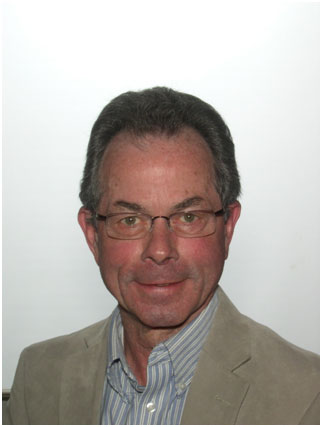 August 13 of this year will mark the one-hundred-year anniversary of one of the most intriguing and historically significant unsolved crimes of the twentieth century; the brutal killing of Dr. William Dean on his hilltop farm in Jaffrey. The story has all the makings of well-crafted fiction: a gruesome, coldblooded murder, war-time international espionage, a mysterious and wealthy stranger living on Dean’s property, his mentally unstable and jealous wife, a prominent citizen with a suspiciously obtained injury, and even a criminal psychologist who claimed he could see the face of the murderer in a photograph of a blood spot.
August 13 of this year will mark the one-hundred-year anniversary of one of the most intriguing and historically significant unsolved crimes of the twentieth century; the brutal killing of Dr. William Dean on his hilltop farm in Jaffrey. The story has all the makings of well-crafted fiction: a gruesome, coldblooded murder, war-time international espionage, a mysterious and wealthy stranger living on Dean’s property, his mentally unstable and jealous wife, a prominent citizen with a suspiciously obtained injury, and even a criminal psychologist who claimed he could see the face of the murderer in a photograph of a blood spot.
As various theories about the murder developed, the townspeople became deeply divided along religious and socio-economic affiliations. No other single event in the history of Jaffrey wreaked such havoc upon the social fabric of the town. A Grand Jury inquest was convened but the findings were inconclusive. The verdict: “Murder by Person or Persons Unknown”. Although much new information has been uncovered, the mystery surrounding the death of William Dean remains unsolved one century later.
In his talk, Jaffrey native Mark Bean will give an overview of the principal people and theories involved in the case. He will explain how his grandfather was very much a part of the story, and how his mother became involved in several important ways more than sixty years after the fact. Mark will talk about the work being done by the research group organized by the Jaffrey Historical Society, of which he is a past president, and will announce the plans for an original theatrical production which will debut at the Meeting House on the actual night of the anniversary of the crime. Mark will attempt to give answers to the what, when, how and possibly even some of the why questions surrounding Jaffrey’s most infamous mystery but will leave it to the audience to reach their own verdict as to who killed Dr. Dean.
A current resident of Nelson, Mark grew up in Jaffrey and graduated from Conant High School in 1972. He has been a career match maker at D.D. Bean & Sons Co. ever since.

